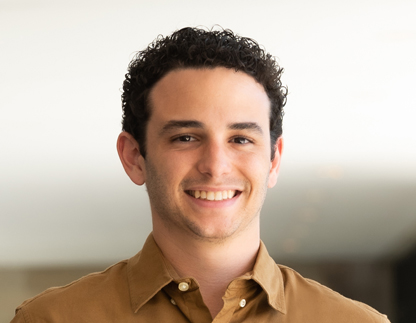I seek to understand and control emergent behavior in complex systems by combining insights from artificial intelligence, statistical physics, biology, and chemical engineering.”
Thomas Berrueta (he/him)
PhD Candidate in Mechanical Engineering, Center for Robotics and Biosystems

Thomas Berrueta is a PhD candidate in Mechanical Engineering at the Center for Robotics and Biosystems in the McCormick School of Engineering. He specializes in the study of complex, often multi-agent, robotic systems and their emergent behaviors. Thomas focuses on the development of algorithmic tools for learning to identify and control such emergent behavior in order to harness it toward achieving challenging objectives. Thomas also is a Presidential Fellow, the most prestigious fellowship awarded to graduate students by Northwestern.
How would you describe your research and/or work to a non-academic audience?
When we observe nature, we routinely find remarkable examples of organisms coming together to achieve things they could not have done on their own. For example, collections of termites can build massive intricate structures for their colonies by working together and splitting up the different aspects of construction. They do so spontaneously, without any leader termite taking charge. Clearly, no individual termite would be able to build such structures on its own—and yet, collectively they achieve so much more.
Across disciplines, this process of "a whole becoming more than the sum of its parts" is described as emergence. As an interdisciplinary scientist and engineer, I seek to understand and control emergent behavior in complex systems by combining insights from artificial intelligence, statistical physics, biology, and chemical engineering. What sorts of principles govern the spontaneous emergence of useful behaviors in complex systems? And how can those principles be exploited to develop reliable machines based on these principles? These are the types of questions that I seek to answer, and my research explores them through the lens of robotics.
What is the biggest potential impact or implication of your work?
The amazing thing about doing work that extends our understanding of self-organization in complex systems (even robotic ones) is the way that it intersects with biology and our knowledge of living beings. In the same way that my research gives me a way to understand what happens when swarms of robots come together and collaborate, it also could be used to understand how cells communicate and come together to achieve functions (like organs do, for example). So, by successfully developing ways to control emergent behavior in robots, we may discover ways to do the same in biological systems. For example, the math that I use to ensure that a robot swarm maintains a formation may one day form the foundation for understanding and influencing the regrowing of limbs in lizards or other animals.
What books are on your bedside table?
Lately I have been enjoying scientific books from various fields, as well as texts in philosophy of science and epistemology. From this latter category, I have been reading The Structure of Scientific Revolutions by Thomas Kuhn, which is a classic indispensable to anyone looking to do science. I also have started reading Vagina Obscura by Rachel E. Gross, which is a fascinating read on the many ways in which misogyny and social taboos have obstructed our understanding of women's health for centuries. I also recently found The Dialectical Biologist by Richard Lewontin to be a very interesting read. In it, Lewontin describes the many ways in which societal factors have shaped our understanding of biology over the years—touching on topics such as eugenics and evolution.
What did you originally want to be when you grew up?
Growing up, there weren't any people in my family interested in STEM or indeed almost any other academic discipline. As it stands, I'm one of very few in my family to ever go into graduate studies. However, when I was 10 years old my cousin told me that she was studying to become a mechanical engineer. Even as a 10-year-old kid I knew how brilliant she was, and just like that she became my role model and taught me math and science. From that moment onward I knew I wanted to be a mechanical engineer. While these days the work I do does not resemble the kind of mechanical engineering my cousin was studying, I still have bottomless gratefulness in my heart for the example she set for me.
Tell us about a current achievement or something you're working on that excites you.
Recently, I have been looking to extend my work on self-organization into a design framework that allows engineers to make use of emergent behaviors in their mechanism designs. In a recent preprint and an accompanying Twitter thread, I explain how to make use of self-organization in the design of components for microrobots. These results are exciting to me because they mark the beginning of a future in which emergence and self-organization can be used as tools to achieve remarkable feats—such as powering microrobotic arms without the need for batteries or external sources of energy.
What are you most proud of in your career to date?
I'm most proud of my work on self-organization that was published in Science. Here, my colleagues and I developed the first broadly applicable theory of self-organization that describes the emergence of order in complex systems away from equilibrium. This ambitious effort forms the foundation for a lot of the work I am currently doing and will continue to do in the near future. More importantly, putting together this manuscript taught me the true disruptive potential of radically interdisciplinary work—which has irreversibly changed the way I approach doing science for the better!
To learn more about Thomas and his work, visit his website at tberrueta.github.io.
Published: July 12, 2022
If you know a graduate student, postdoctoral trainee, graduate faculty member, staff member, or a member of our TGS alumni population who would make a great candidate for our TGS Spotlight Series, please complete this brief TGS Spotlight Series Nomination Form.